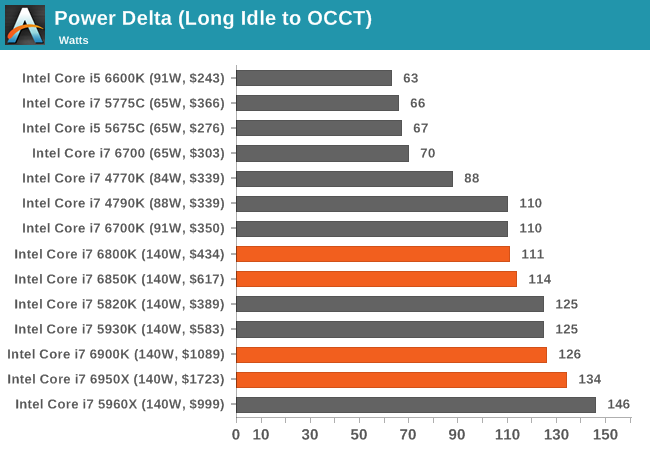The Intel Broadwell-E Review: Core i7-6950X, i7-6900K, i7-6850K and i7-6800K Tested
by Ian Cutress on May 31, 2016 2:01 AM EST- Posted in
- CPUs
- Intel
- Enterprise
- Prosumer
- X99
- 14nm
- Broadwell-E
- HEDT
Load Delta Power Consumption
Power consumption was tested on the system while in a single MSI GTX 770 Lightning configuration with a wall meter connected to the OCZ 1250W power supply. This power supply is Gold rated, and as I am in the UK on a 230-240 V supply, leads to ~75% efficiency > 50W, and 90%+ efficiency at 250W, suitable for both idle and multi-GPU loading. This method of power reading allows us to compare both the power management of the BIOS and the board's ability to supply components with power under load, and includes typical PSU losses due to efficiency.

Each of the Broadwell-E SKUs are rated at 140W, however they vary between 6 cores and 10 cores and with different frequencies. Normally one would assume that the core/frequency ratio would be adjusted to match TDP, but ultimately using more cores can consume more power. We see a distinct increase in power consumption moving up the product stack.
Prime95 Core Loading
For this review, we also looked into peak delta power draw when varying the number of cores using Prime95’s mode for peak power consumption. Prime95 identifies cores with multiple threads and adjusts its loading/pinning accordingly.

Broadwell-E Overclocking
Methodology
Our standard overclocking methodology is as follows. We select the automatic overclock options and test for stability with PovRay and OCCT to simulate high-end workloads. These stability tests aim to catch any immediate issues with memory or CPU errors.
For manual overclocks, based on the information gathered from previous testing, we start off at a nominal voltage and CPU multiplier, and the multiplier is increased until the stability tests are failed. The CPU voltage is increased gradually until the stability tests are passed, and the process repeated until the motherboard reduces the multiplier automatically (due to safety protocols) or the CPU temperature reaches a stupidly high level (100ºC+). Our test bed is not in a case, which should push overclocks higher with fresher (cooler) air.
Overclock Results
Due to time constraints we were only able to overclock the i7-6950X using the MSI X99A Gaming Carbon motherboard. MSI has improved its overclocking options as of late on the Z170 platform to make it easier to use, but our BIOS did not have those most recent updates, particularly for load line calibration. However, our sample hit 4.1 GHz at 1.30 volts before the OCCT load temperatures were prohibitive to move up any further. We saw similar things when testing the mainstream Broadwell parts with Iris Pro, which shows that this sort of overclocking performance might be indicative of the silicon itself.
That being said, speaking with our contacts at various motherboard manufacturers, we're told that 4.1 GHz is a reasonably average processor result for Broadwell-E. Some processors will hit 4.3 GHz on air at around the same voltage, whereas others need up to 1.4 volts, and thus results will depend on the cooling setup used or the thermal characteristics of the silicon. I have also been told that AVX is a different story: for any peak frequency attained normally, AVX overclock stable frequencies will be around 200-300 MHz lower.











205 Comments
View All Comments
jwcalla - Tuesday, May 31, 2016 - link
No time for a 1070 review but a dozen-page day-one review for a platform nobody is going to buy.rhysiam - Wednesday, June 1, 2016 - link
Different authors. It's Ryan Smith who tackles the GPU reviews.GreenReaper - Thursday, March 2, 2017 - link
It is just as important to write the reviews for things people should not buy as it is for those they should. Perhaps more-so, so that people avoid making a mistake!ex_User - Tuesday, May 31, 2016 - link
Haven't you forgotten to change the following line on overclocking page: "MSI has improved its overclocking options as of late on the Z170 platform(...)"?jardows2 - Tuesday, May 31, 2016 - link
Little confused. The chart shows the i7-6950X as 10 core/ 20 threads, but you state it is"a full $634 more than the 8-core i7-6900K"I thought the i76900K was 4 core - 8 threads. Am I missing something here?
GTRagnarok - Tuesday, May 31, 2016 - link
6900K is 8C/16T. Maybe you're thinking of the mainstream Skylake 6700K?jardows2 - Tuesday, May 31, 2016 - link
That would be my confusion! Thanks for setting me straight!mapesdhs - Thursday, June 9, 2016 - link
Don't blame yourself, Intel's product naming is really dumb.zeeBomb - Tuesday, May 31, 2016 - link
Golly...dreams money CAN'T buy.maxxbot - Tuesday, May 31, 2016 - link
I've been easy on Intel these past few years but they deserve nothing but ridicule for this launch, the fact that you still need a spend a full $1000 for any 8-core CPU is a disgrace.